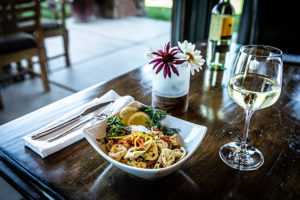TROON SIPS
Guts and Gusto
Chef Clark Norris of Red Ledges
Describe your culinary approach as a chef.
Chef Norris: My culinary approach as a chef is fundamental: To provide classic and creative cuisine that resonates with our clientele, with specific attention to quality, details of preparation, presentation, and timeliness; and do it consistently day-in and day-out. Simple, right?! Over the span of my experience in the industry, like many ideals in the last 40 years, how this is achieved continues to evolve. The male-dominated brigade system of kitchen hierarchy and discipline of old have, thankfully, faded fast. Bless the women in hospitality who have mentored and inspired me to excellence early in my career, and to those I continue to learn and grow with.
How do you apply your approach?
Applying this approach has also become somewhat fundamental. Build a team based on mutual respect and trust without bias and prejudice. Lead by example, understand and accommodate your staff’s needs whenever reasonable. Promote and maintain a safe and hospitable work environment while we all endure the often hot and stressful demands of restaurant work. The natural benefit of this is I get to do what I love. I get to be much more hands-on in the kitchen. My talent is cooking, and I understand that being a chef comes with a lot of other responsibilities, and thankfully I have the support at Red Ledges to share them. There’s not much artistry in payroll, ordering, and inventory. It’s part of the program, but anytime I can spend time in the kitchen and develop new recipes, it’s magic.
What is your favorite dish or style of cuisine to prepare?
The one I’m craving at the moment.
What’s one ingredient you can’t live without?
The Beatles had it right: “Love is all you need.”
What’s a local favorite dish at Juniper Grill?
I harvest fresh rhubarb from the garden and combine with local cherries into a fabulous deep-dish cherry rhubarb pie, an early summer dessert delight.
What inspires you?
Many of the people I work with are inspiring — that’s the benefit of working with multi-national teams over the years. So many are dedicated to the profession, so eager; they want to learn and share what they know. I’ve learned so much about their cultures, what I can do with elements of this or that cuisine. Building a taste memory of how a culture’s traditional ingredients combine and in what proportions lends to the tweaking of classic recipes and also creating new, perhaps original, cross-cultural dishes. Shoyu finds its way into many of my “western” preparations, and fish sauce adds an apt nuance to my gumbo!





